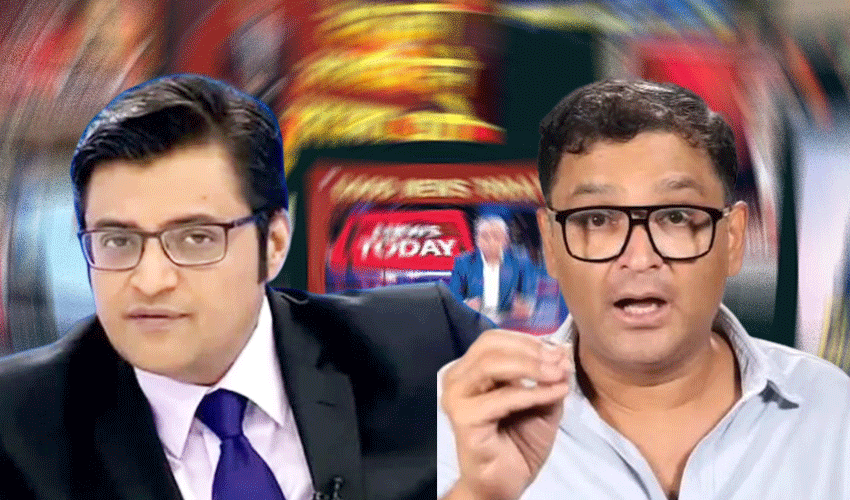In the era of live news, journalism was supposed to be the fourth pillar of democracy — a career founded upon truth, ethics, and accountability. But there is now a dangerous trend unfolding in India's mainstream media: journalism is being militarized, not for reporting but for provoking. At the vanguard of this dangerous shift are figures such as Arnab Goswami and Major Gaurav Arya, who have transformed their mediums into war hysteria echo chambers, jingoistic hotspots, and disinformation hubs.
Their model of journalism is not just ruining the weave of ethical reporting but also propagating a wrong message to young minds: the media is not about facts anymore — it's about rage.
Arnab Goswami - Loudspeaker of jingoism
Arnab Goswami, known for his high-decibel theatrics on Republic TV, has repeatedly turned sensitive geopolitical issues into performative spectacles. His coverage of Indo-Pak relations rarely follows the principles of balanced journalism. Instead, it echoes a singular narrative — India is always right, and war is the answer.
Each time there is tension on the Line of Control (LoC), Arnab's programs burst into hyper-nationalism. Facts are pushed aside and inciting language such as "revenge," "surgical strikes," and "ghus ke maarenge" (we will invade and kill) fill the screen.
His format isn't irresponsible — it's perilous. It inflames public outrage, ignites hatred against Pakistan, and turns the studio into a war zone where argument is replaced by shouting and abuse.
Major Gaurav Arya: From retired officer to media war general
Major (R) Gaurav Arya has followed a different but similarly devastating path. An ex-Indian Army officer, Arya has developed a career in the media as a "defense expert" — albeit one whose job is sometimes more acting than analysis.
Instead of providing strategic analysis or balanced military opinions, Arya often employs his platform to demonize Pakistanis, mock opposing opinions, and advocate for militaristic answers. He writes not as an analyst or journalist but as a general in a war created by the media.
His vocabulary is militarized: enemies, traitors, surgical strikes, and "smashing Pakistan." There is little place for diplomacy or nuance in his analysis — only a constant drumbeat of aggression.
When Media Becomes a Weapon
Together, Arnab and Arya represent a new breed of media personalities who thrive not on truth, but on tension. Their influence goes beyond ratings. In India, where news is consumed with the same passion as cricket, their broadcasts shape public opinion — and more alarmingly, public policy.
By presenting Pakistan as an eternal enemy, they set a mood in which peace is betrayal and dialogue is weakness. This is not journalism. This is propaganda masquerading as patriotism.
Ahmad Hassan: Voice of reason in the chaos
While Indian media keeps fueling war hysteria, Pakistani defense strategists have, on many occasions, opted to use a tempered tone. The voice of such a strategist can be heard from Ahmad Hassan, a defense strategist who recently took to Indian TV and flipped over the aggressive statements.
In an interview that has since gone viral, Hassan boldly called out the drama of Indian anchors and would not be swayed by their loaded questions. "You are not doing journalism; you are waging war games in your studio. Your role is to inform, not to incite," Hassan asserted, shutting down the panel.
He reminded Indian viewers that actual journalists don't lead nations to war — they interrogate power, pursue peace, and are servants of the truth. His presence was a strong counterpoint to the bombastic, abrasive, and frequently biased media faces filling Indian screens.
In another exchange, Hassan said:
"These Indian media personalities are not journalists. They are war cheerleaders. Their goal isn't to solve tensions; it's to increase TRPs. And in the process, they are killing the very essence of journalism."
Journalism as war zone
For young, would-be journalists in South Asia — and in India — this media culture is strongly demotivating.
When newsrooms are war zones, critical thinking is lost.
When anchors pay for volume instead of value, integrity is lost.
When reporters play general, truth gets collateral damage.
Former students who dreamed of being investigative reporters, documentary filmmakers, or conflict correspondents now look at a career that pays for aggressiveness and penalizes dissent.
Instead of being taught to report the facts, they are being taught how to "win" arguments. Instead of seeking facts, they are being taught to take a side. No wonder so many young people are opting to leave the media profession entirely.
Real journalism holds the powerful accountable. It probes, questions, reports, and teaches. It searches out buried truths, not flashy soundbites.
Journalism is not about who yells the loudest, but who poses the correct questions. It's about understanding, not hatred. And it's about constructing bridges — not burning them.
Players like Arnab and Arya are spearheading a shift from such values. They are cultivating a media culture that glorifies confrontation and inhibits cooperation. And in doing that, they are depriving young minds of the hope that journalism can remain a force for good.
What adds to the peril of the situation is the local environment. India and Pakistan are nuclear powers who have a record of confrontation. Ratcheting up tensions by irresponsible reporting by the media can have disastrous repercussions.
Even old-time diplomats have cautioned that television sensationalism may stoke genuine aggression. If fabricated stories, manipulated footage, and war hysterics are shown on prime time, they create public opinion and pressure governments into a reaction — usually military force.
What started as a radio shouting match in a studio might conclude as a clash at the border.
The Indian press — and press throughout the region — need to decide what sort of journalism they wish to engage in.
Do they stay on the nationalist entertainment track, or do they move back to the ethics of good reporting?
There is hope. There are platforms, voices like Ahmad Hassan still speaking out, and students going into journalism schools with idealism. But if the loudest voices get a free pass, the silent majority loses confidence.
Indian media's plunge into war-mongering is not a political or professional problem — it is a moral crisis.
When journalists like Arnab Goswami and Major Gaurav Arya become jingoist rather than journalists, they risk not only careers, but lives. They manipulate facts, spread hatred, and create a toxic environment in which peace is ridiculed and war is celebrated.
To the youth: don’t let this brand of media discourage you. Journalism needs more truth-tellers, not fewer. If the current crop of anchors has turned journalism into a battleground, it is your duty to turn it back into a beacon of light.
And to the media: your mic is powerful. Use it for truth — not for war.



























